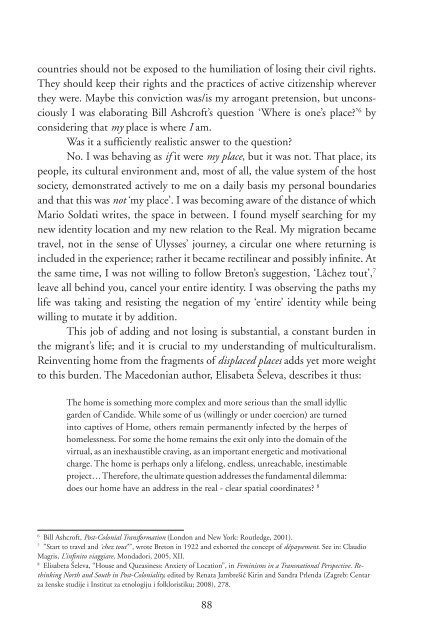Teaching Subjectivity. Travelling Selves for Feminist ... - MailChimp
Teaching Subjectivity. Travelling Selves for Feminist ... - MailChimp
Teaching Subjectivity. Travelling Selves for Feminist ... - MailChimp
You also want an ePaper? Increase the reach of your titles
YUMPU automatically turns print PDFs into web optimized ePapers that Google loves.
countries should not be exposed to the humiliation of losing their civil rights.<br />
They should keep their rights and the practices of active citizenship wherever<br />
they were. Maybe this conviction was/is my arrogant pretension, but unconsciously<br />
I was elaborating Bill Ashcroft’s question ‘Where is one’s place?’ 6 by<br />
considering that my place is where I am.<br />
Was it a sufficiently realistic answer to the question?<br />
No. I was behaving as if it were my place, but it was not. That place, its<br />
people, its cultural environment and, most of all, the value system of the host<br />
society, demonstrated actively to me on a daily basis my personal boundaries<br />
and that this was not ‘my place’. I was becoming aware of the distance of which<br />
Mario Soldati writes, the space in between. I found myself searching <strong>for</strong> my<br />
new identity location and my new relation to the Real. My migration became<br />
travel, not in the sense of Ulysses’ journey, a circular one where returning is<br />
included in the experience; rather it became rectilinear and possibly infinite. At<br />
the same time, I was not willing to follow Breton’s suggestion, ‘Lâchez tout’, 7<br />
leave all behind you, cancel your entire identity. I was observing the paths my<br />
life was taking and resisting the negation of my ‘entire’ identity while being<br />
willing to mutate it by addition.<br />
This job of adding and not losing is substantial, a constant burden in<br />
the migrant’s life; and it is crucial to my understanding of multiculturalism.<br />
Reinventing home from the fragments of displaced places adds yet more weight<br />
to this burden. The Macedonian author, Elisabeta Šeleva, describes it thus:<br />
The home is something more complex and more serious than the small idyllic<br />
garden of Candide. While some of us (willingly or under coercion) are turned<br />
into captives of Home, others remain permanently infected by the herpes of<br />
homelessness. For some the home remains the exit only into the domain of the<br />
virtual, as an inexhaustible craving, as an important energetic and motivational<br />
charge. The home is perhaps only a lifelong, endless, unreachable, inestimable<br />
project… There<strong>for</strong>e, the ultimate question addresses the fundamental dilemma:<br />
does our home have an address in the real - clear spatial coordinates? 8<br />
6<br />
Bill Ashcroft, Post-Colonial Trans<strong>for</strong>mation (London and New York: Routledge, 2001).<br />
7<br />
”Start to travel and ‘chez tout’’”, wrote Breton in 1922 and exhorted the concept of dépaysement. See in: Claudio<br />
Magris, L’infinito viaggiare, Mondadori, 2005, XII.<br />
8<br />
Elisabeta Šeleva, “House and Queasiness: Anxiety of Location”, in Feminisms in a Transnational Perspective. Rethinking<br />
North and South in Post-Coloniality, edited by Renata Jambrešić Kirin and Sandra Prlenda (Zagreb: Centar<br />
za ženske studije i Institut za etnologiju i folkloristiku; 2008), 278.<br />
88

















